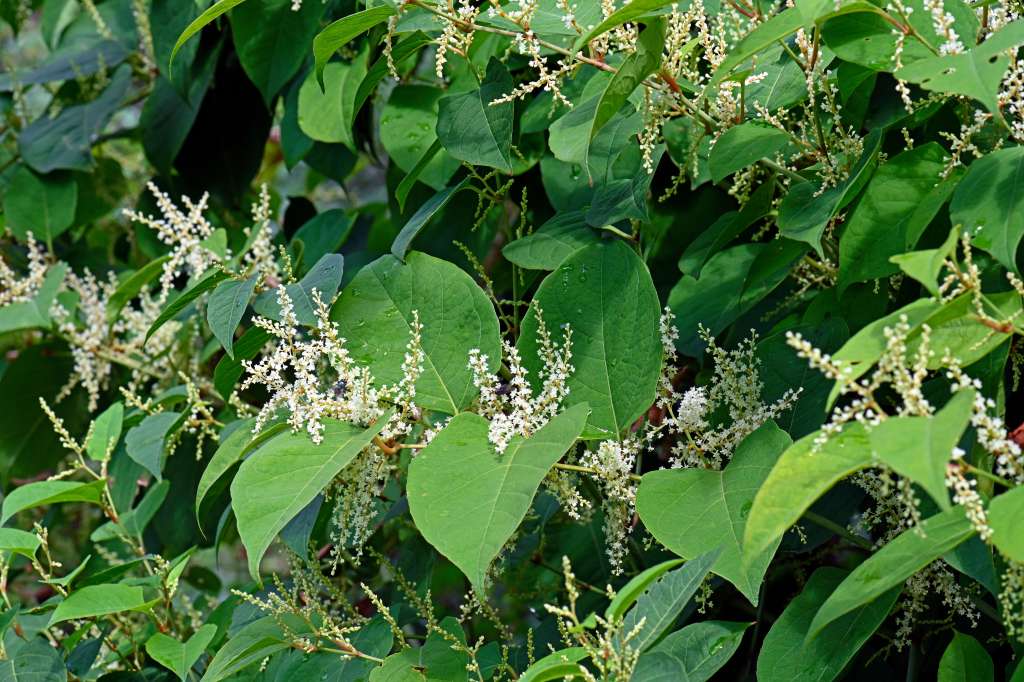Everchanging government legislation, fluctuating house prices, property maintenance – there’s no shortage of things for landlords to keep on top of. At first glance, an invasive plant might not seem a major concern.
But if left unchecked, it can have severe repercussions both financially and legally. Here’s everything landlords need to know about Japanese Knotweed.
What is Japanese Knotweed?
Known for its rapid growth, Japanese Knotweed is an invasive plant that’s notoriously hard to get rid of. This plant has distinctive heart-shaped leaves, bamboo-like stems, and clusters of small white flowers.
Its roots can grow to a depth of two metres and its foliage is dense. It’s become very unpopular with both tenants and landlords and it causes problems that aren’t always straightforward to solve.
Why is Japanese Knotweed bad for landlords?
Property damage is the main concern for landlords when dealing with Japanese Knotweed. It has the potential to grow through concrete, tarmac, and the foundations of buildings.
And because of the depth of Japanese Knotweed’s roots, there’s been issues with them interfering with drainage systems and pipes too.
Unless these issues are addressed, damage to the property will only worsen over time.
Japanese Knotweed identification – how to spot it early
Japanese Knotweed can be easily confused with other plants – Russian vine, Himalayan honeysuckle, and broad leaf dock all have similar characteristics to Japanese Knotweed.
In the picture below, you can spot a few unique features that can help identify Japanese Knotweed:
- red stems
- cream coloured flowers
- flat, shovel-shaped leaves
- a zig-zag shaped stem

Madeleine Steinbach/stock.adobe.com
The vines start to grow from the end of April and can grow up to 10cm a day and then it flowers from August to September. Japanese Knotweed is much easier to eradicate if identified early, so it’s useful for landlords to be able to spot it.
But even if it’s grown out of control, there are ways to remove it effectively.
Japanese Knotweed removal
Removing Japanese Knotweed from your property isn’t straightforward. Effectively eradicating it yourself is complex – practically and legally.
If you need to get rid of Japanese Knotweed, you have three options:
- dig deep into the ground and remove the root
- use a chemical weed killer
- seek professional help
If you decide to remove Japanese Knotweed yourself, using a chemical weedkiller is the simplest option. A glyphosate-based weedkiller is the most effective at getting to the root of the weed.
It usually takes three to four seasons to completely eradicate Japanese Knotweed with a weedkiller as it tends to regrow the following spring with a very different appearance.
A small leafy bush will grow in its place the following spring and it’s essential you remove this until it doesn’t return.
If you’d prefer to dig up the Japanese Knotweed, you’ll need to dig at least one metre deep and remove all the roots and rhizomes.
You then need to take precautions when you dispose of it. Japanese Knotweed has to go to a licensed landfill. You can contact the Environment Agency and they’ll let you know where to go.
This is why many landlords choose to seek professional help as it reduces the chance of it coming back and you won’t have to handle the disposal of it.
Property Care Association has a list of licensed contractors that can remove Japanese Knotweed from your property.
Legal considerations
If there’s Japanese Knotweed at one of your properties, there are some legal implications for landlords to be aware of.
When you or your tenant find Japanese Knotweed on your property, your tenancy agreement will state whose responsibility it is to remove it.
But acting quickly is important when dealing with Japanese Knotweed, so you may want to take on the responsibility yourself. Especially to avoid any potential damage to your property.
When disposing of Japanese Knotweed, you need to take care as it’s classified as ‘controlled waste’. Under the Environmental Protection Act 1990, it’s an offence to incorrectly dispose of Japanese Knotweed and you could unintentionally break the law.
If you’re selling a property, you’re legally required to check for Japanese Knotweed and add it to the property information form when it’s found. It’s an offence to not share this information if you’re aware of it.
Insurance and mortgages
Because of the risks to your property when removing Japanese Knotweed, landlords need to consider their insurance before deciding what to do.
If you, your tenant, or an unqualified gardener decide to remove the Knotweed without professional assistance, you may compromise your property’s insurance.
If you were to manually remove Japanese Knotweed from your property and unintentionally damage some pipes or cause instability in a wall, there’s a chance your insurance won’t cover the costs.
Professional contractors can offer insurance-backed guarantees on their work. This is a more expensive option but can provide peace of mind that your property is protected.
Make sure you check your policy with insurer before removing Japanese Knotweed as some insurers have it listed as an exlusion.
Mortgage lenders are less cautious than in the past when it comes to Japanese Knotweed because of improved methods of removing it. Lenders usually want to see a management plan that outlines how you’ll effectively remove it from the property.
This is where having an insurance-backed contractor may be useful as it’s more reliable than a non-professional removing the Japanese Knotweed. You should contact the Royal Institution of Chartered Surveyors if you’re unsure on what to do next.
More useful articles for landlords
- Rental reforms published
- A guide to gas safety certificates
- Buy-to-let tax changes
- What is contents insurance?
Has your property been affected by Japanese Knotweed? Let us know in the comments below.
Get set with tailored landlord cover
Over 200,000 UK landlord policies, a 9/10 customer rating and claims handled by an award-winning team. Looking to switch or start a new policy? Run a quick landlord insurance quote today.
bennytrapp/stock.adobe.com
